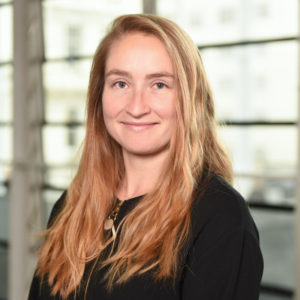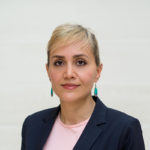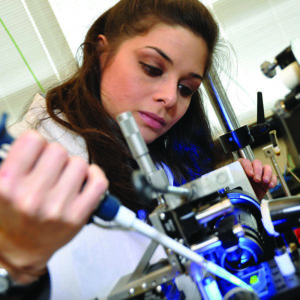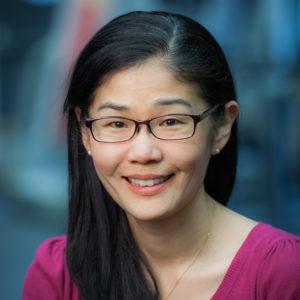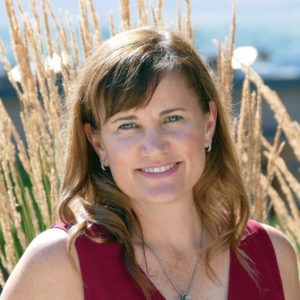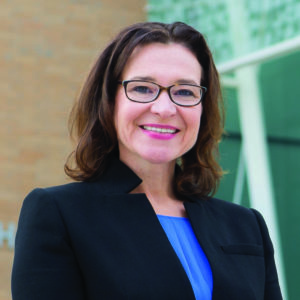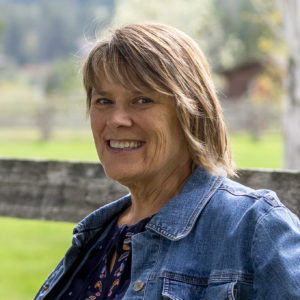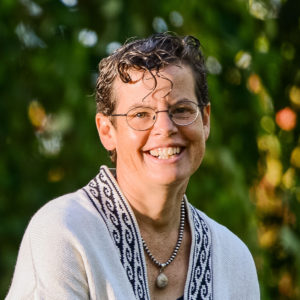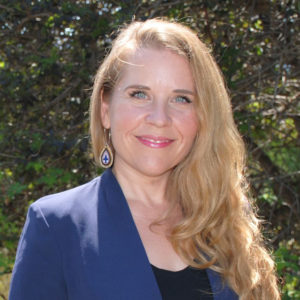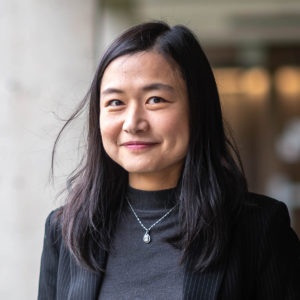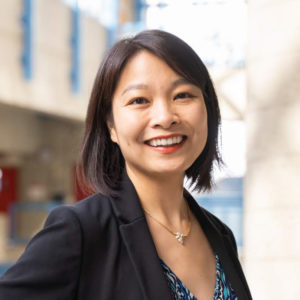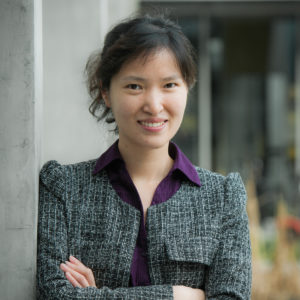From vaccine development to building wearable infection detectors, women at UBC are making significant contributions to the COVID-19 research front.
In celebration of International Women's Day, a few of these inspiring faculty members tell us about their work and offer advice for young women and girls considering a career in research.
Dr. Anna Blakney: Talking about vaccines through TikTok
When Dr. Anna Blakney isn't working as an assistant professor in UBC's Michael Smith Laboratories and school of biomedical engineering, she spends her time communicating about COVID-19 vaccines through the popular social media platform TikTok.
"It may seem like a silly idea but it's actually turned out to be a powerful way to show people what I do in the lab and answer any questions they may have about vaccines," says Dr. Blakney.
Dr. Blakney came to UBC in January from Imperial College London, where she worked on a COVID-19 vaccine based on the self-amplifying RNA platform. This vaccine technology is similar to those used by Pfizer/BioNTech and Moderna, except it is able to replicate itself in cells so patients can receive a lower dose.
Her advice for aspiring young researchers? "If I can do it, so can you," she says. "Science definitely takes grit and resilience, but when an experiment works or you make a discovery, it's an amazing feeling.
And it's an incredibly empowering field-how cool is it that I can make a vaccine in the lab?"
Dr. Farinaz Havaei: Workplace psychological health and safety for nurses
As an assistant professor and the lead scientist on four research projects looking at workplace psychological health and safety of nurses, including those working in long-term care homes, Dr. Farinaz Havaei's work has been especially vital during the pandemic.
"The most rewarding part of my work is having the privilege of listening to and sharing the voice of nurses, residents and families," she says. "Being able to witness the incremental positive changes in their health and wellbeing because of the scientific evidence generated through our collaborative research is what motivates me every day."
Dr. Havaei encourages young women who aspire to pursue a career in research to do it. "Never underestimate yourself," she says.
Dr. Mina Hoorfar: Wearable sensors to detect viral infection
Dr. Mina Hoorfar is leading a research team seeking to develop a two-in-one COVID-19 viral and immune detection platform.
"There is a worldwide diagnostic gap for COVID-19 testing that is fast, reliable and affordable," says Dr. Hoorfar. "Through our work, we are aiming to develop a wearable sensor that can rapidly detect an immune response to COVID-19 within hours of infection."
Dr. Hoorfar says she hopes more girls and young women consider pursuing a career in engineering.
"Data shows that when diversity in science and engineering increases, so does productivity and innovation," says Hoorfar. "We need to bridge the disparity in representation and realize the full potential of diverse research teams for meeting the complex health, safety and environmental challenges of today and tomorrow."
Dr. Teresa Liu-Ambrose: The effect of COVID-19 on the brain
As director of the aging, mobility and cognitive neuroscience lab at UBC's Djavad Mowafaghian Centre for Brain Health, Dr. Teresa Liu-Ambrose and her team are trying to figure out if the damage caused by the novel coronavirus is prematurely aging the brain.
The team is comparing the cognitive function, brain structure, and brain function of adults who have recovered from COVID-19 to those of individuals who have not been infected.
"We hope that our results will help us better understand whether COVID-19 survivors need to have their cognitive function monitored over time, and whether preventative and therapeutic approaches could be helpful for promoting brain health in these patients," she says.
Dr. Liu-Ambrose encourages any young girls and women aspiring to be researchers to surround themselves with others who are supportive of their goals.
"Supporting more women to pursue a career in research is critical because it ultimately impacts what we all learn from research," she says. "A lack of diversity greatly impacts innovation, creativity, and ultimately the relevance of research findings for all individuals of society."
Dr. Lesley Lutes: Health and wellbeing during the pandemic
Dr. Lesley Lutes, professor of psychology at UBC Okanagan, is leading a clinical trial that seeks to address the health and well-being challenges of living through a pandemic. She and her research team are studying the effectiveness of a 12-week evidence-based well–being program that has been tailored to the specific challenges of COVID-19.
The research team is currently analyzing data collected through the study and hope to make the program available to the public early next month.
"Hopefully this research will show that making small changes in both how we care for ourselves and others in our lives will not only buffer against the negative psychological impacts of COVID-19, but also help remind us of our resilience, improve our health, well-being, and life satisfaction," says Dr. Lutes.
Dr. Lutes encourages any aspiring young students to get involved in research early.
"I discovered my passion for research as an undergraduate, fell in love with it as a graduate student, and recently have seen the power that it can have," she says. "Thirty years ago, I applied to UBC and was rejected because my grades were not quite 'good enough.' I am now a full professor at this same university. The lesson: dream big. Be persistent. But also, embrace everything that comes your way-both successes and failures. You never know what will happen in the future."
Dr. Kathleen Martin Ginis: The impact on Canadians with disabilities
Dr. Kathleen Martin Ginis, director of the Centre for Chronic Disease Prevention and Management at UBC Okanagan's Southern Medical Program, is leading research to identify the impact of the pandemic on Canadians with disabilities. Her work is being used to help shape policies and pandemic response strategies.
"It's hugely rewarding to be able to give a voice to a segment of the population that has been disproportionately affected by COVID-19 risks and restrictions, and whose health and well-being needs are not being met," she says.
She encourages any girls and young women aspiring to be researchers to not be afraid to ask questions and to share their ideas.
"Women often bring different 'lenses' and experiences to research," she says. "By encouraging and supporting women to pursue careers in research, we create opportunities to significantly expand what we know and how we know it."
Dr. Nelly Oelke: Mental health in rural B.C. communities
Dr. Nelly Oelke, associate professor in the school of nursing at UBC Okanagan, is looking at the impact of COVID-19 on mental health, particularly in three rural communities in B.C. Her team is working with each community to co-create recommendations to help them build resilience against disruptive situations such as pandemics and climate change events.
"My passion comes from trying to make a difference for people, especially those that are impacted by various inequities in our system," says Dr. Oelke. "These include rural community members, people who experience a mental health or substance use concern, and people who experience racism and discrimination."
Her advice for aspiring young female researchers? "Be curious, and let your curiosity show by asking questions."
Dr. Sally Otto: Predicting the evolution of COVID-19
Dr. Sally Otto, an evolutionary biologist in the UBC faculty of science, is collaborating with a team that provides modelling support to help guide B.C.'s COVID-19 policies.
The research team has addressed many important questions about the novel coronavirus, from how schools affect the spread of the virus to how case numbers are expected to change over time, and how we can prevent the spread of variants.
Dr. Otto's advice for young women considering a career in science is to follow their passion. For her, she says that was combining math and biology as well as her desire to make a difference in the world.
"Evolution is such a rich and complex process-if we only look at it one way, then we get a skewed and limited understanding of the world," she says. "We need to encourage people from all backgrounds and all identities to join science so that we more fully understand the world around us."
Dr. Katrina Plamondon: Advancing health equity
To help address gaps in access to health care related to the pandemic, Dr. Katrina Plamondon is leading research that aims to shift the focus of public health and global health interventions toward equity.
Part of the work involves raising awareness about the importance of equitable access to COVID-19 vaccines globally, gathering voices from across Canada's global health research community to advance evidence and equity-informed calls for action federally and internationally. Rich countries' efforts to protect their own national interests, she says, will prolong the pandemic everywhere. Her interest in advocating for equity extends to advocating for representational equity in research as well.
"Encouraging and supporting the pursuit of research careers by women and others who navigate unearned disadvantage requires careful consideration of the systems, structures, and norms that contribute to these inequities," she says. "The more we understand the root causes of inequities and how they manifest, the more likely it will be to see balanced representation-and open possibilities to transform systems that have, for too long, excluded their voices."
Dr. Yue Qian: Anti-Asian discrimination and mental health
Working with collaborators around the world, Dr. Yue Qian has published research on how residents of Wuhan coped with a 76-day lockdown at the start of the pandemic.
She is now researching how anti-Asian discrimination during COVID-19 adversely affected Asian people's mental health in Canada and the United States, as well as how the pandemic is widening economic inequality in China and also hurting working mothers in Canada.
"The pandemic is changing our society in real ways," she says. "Conducting research on topics I care deeply about is the least I can do to help more people understand and better cope with the pandemic."
Dr. Qian encourages girls and women who aspire to be researchers to "find your village."
"Seek mentors who recognize your amazing talent and support you. Join forces with other women and allies in collaborations and lift each other up," she says.
Dr. Nancy Sin: The psychological impact of the pandemic
Dr. Nancy Sin, assistant professor of psychology, is co-leading a research project examining stress and coping in daily life during the pandemic, with an emphasis on aging. Along with her colleague Dr. Anita DeLongis, the research team is also examining sources of resilience during the pandemic.
"Multilevel solutions are needed to address the psychological impacts of the pandemic, from the individual level to changes in institutional policies," she says. "At the individual level, our research has pointed to activities that people can engage in-including volunteering, creating minor positive experiences in daily life, and maintaining consistent and good-quality sleep-that can help offset the negative emotional impacts of stress."
Dr. Sin says and the most rewarding aspect of her work is serving as a mentor for students and junior researchers.
"By making science more inclusive for women and for people from diverse and underrepresented backgrounds, we can use research tools to ask important questions and find solutions to problems that may have been previously overlooked," she says.
Dr. Siyun Wang: Preventing the spread of COVID-19 in the food supply chain
To help develop evidence-based guidelines to prevent the spread of the novel coronavirus within the food supply chain, Dr. Siyun Wang is leading a joint research project with the BC Centre for Disease Control and Agriculture and Agri-Food Canada.
"The most rewarding part of my work is being able to apply my research findings to real-world scenarios and to help resolve current issues associated with food security and public health," says Dr. Wang, associate professor of food safety engineering in UBC's faculty of land and food systems.
Dr. Wang encourages any aspiring young female researchers to not be afraid to try new things. "There are endless possibilities," she says.

